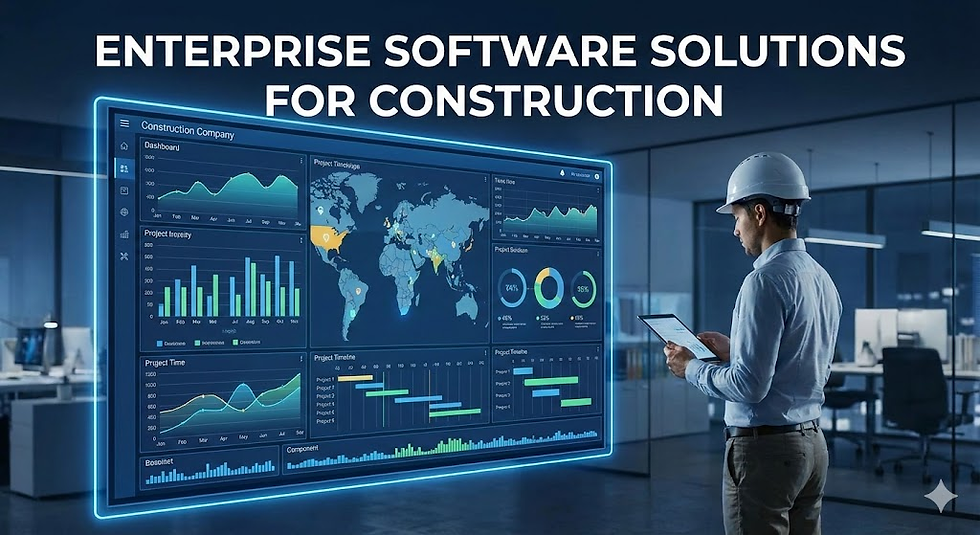Enterprise Software Solutions for HR Companies and Firms
- Staff Desk
- May 29, 2025
- 7 min read

Human Resources (HR) companies and firms are at the heart of every organization’s success, managing talent acquisition, employee engagement, compliance, payroll, and performance management. With rapidly evolving workforce dynamics, regulatory complexities, and digital expectations, HR firms are turning to enterprise software solutions to streamline operations, enhance decision-making, and deliver superior services to clients.Whether you're looking to find an executive search firm for senior leadership hiring or implement enterprise-wide talent strategies, technology plays a vital role in optimizing HR functions.
In this comprehensive blog, we explore the transformative impact of enterprise software on HR firms, backed by industry facts and research, and explain why modern HR organizations cannot afford to ignore this technology revolution.
The Role of Enterprise HR Software in Modern Organizations
Today’s HR firms and departments rely heavily on enterprise HR software to manage everything from recruitment and onboarding to payroll and compliance. These comprehensive tools are built to handle large-scale human resources operations efficiently. With HR enterprise software, companies can centralize employee data, streamline workflows, and ensure compliance with labor regulations. As a result, enterprise HR systems have become a core part of the digital transformation in HR.
The Current Landscape of HR Firms
• Global HR software market size was valued at around $22.8 billion in 2023 and is projected to grow at a CAGR of approximately 10% through 2030 (source: Grand View Research).
• The rise of remote and hybrid work models demands cloud-based, accessible platforms.
• Increasing focus on diversity, equity, and inclusion (DEI) requires data-driven hiring and engagement tools.
• Complex labor laws and compliance standards create high stakes for accurate record-keeping and reporting.
• Talent shortages and competition are pushing HR firms to leverage technology for faster recruitment and retention.
Key Features of Enterprise HR Solutions
Whether you’re a growing company or a global enterprise, implementing enterprise HR solutions can drastically improve how you manage your workforce. These platforms typically include enterprise human resources software modules for performance tracking, employee self-service portals, benefits administration, and real-time analytics. More advanced enterprise HRIS software also integrates AI tools for talent forecasting and automated compliance reporting. With an adaptable enterprise HR platform, HR professionals gain powerful insights that drive employee engagement and operational efficiency.
Key Enterprise Software Solutions for HR Companies
Enterprise software tailored for HR firms integrates various modules into a centralized platform, enabling end-to-end management of HR processes.
1. Applicant Tracking System (ATS)
Finding the right talent efficiently is a core challenge. An ATS within HR software helps firms by:
• Automating job posting across multiple channels.
• Parsing resumes with AI to shortlist candidates.
• Tracking candidate communication history.
• Scheduling interviews and assessments.
Studies show companies using ATS report a 30-50% reduction in time-to-hire (source: SHRM).
2. Human Capital Management (HCM)
HCM modules manage the entire employee lifecycle, from onboarding to offboarding, including:
• Digital employee records.
• Automated workflows for leave requests, promotions, and transfers.
• Training and development management.
• Succession planning tools.
Gartner reports that organizations using integrated HCM systems experience 20% higher employee engagement.
3. Payroll and Compensation Management
Handling payroll accurately is crucial to avoid penalties and maintain morale. Enterprise software provides:
• Automated salary calculations, including tax deductions and benefits.
• Integration with time tracking and attendance.
• Compliance with country-specific tax codes and labor laws.
• Self-service portals for employees to view payslips and tax documents.
The global payroll software market is expected to reach $15 billion by 2027 (source: MarketWatch).
4. Performance Management
Driving performance and productivity requires continuous feedback and objective setting. Enterprise software facilitates:
• Goal setting aligned with company strategy.
• 360-degree feedback collection.
• Automated performance review cycles.
• Analytics on performance trends and training needs.
Firms with software-enabled performance management have 25% higher productivity on average (source: Deloitte).
5. Employee Engagement and Wellness
Happy employees are more productive and loyal. Enterprise solutions now include:
• Pulse surveys and sentiment analysis.
• Recognition and rewards platforms.
• Wellness program integration.
• Chatbots for HR queries and support.
Research indicates engaged employees are 21% more profitable (Gallup).
6. Compliance and Risk Management
HR firms must ensure compliance with labor laws, data privacy (e.g., GDPR), and reporting standards. Enterprise systems offer:
• Automated alerts for regulatory changes.
• Audit trails and document management.
• Policy distribution and acknowledgment tracking.
• Incident reporting and case management.
Non-compliance costs U.S. businesses $14,000 per employee annually on average (source: Compliance Week).
7. Analytics and Reporting
Data-driven HR is no longer optional. Enterprise software helps firms:
• Track hiring metrics, attrition rates, and workforce demographics.
• Identify skills gaps and training ROI.
• Forecast workforce needs based on business goals.
• Prepare reports for clients with custom KPIs.
Organizations with HR analytics are 4 times more likely to make better decisions (source: Deloitte).
Why HR Firms Need Enterprise Software Now
Addressing the Talent War
With unemployment rates at historic lows in many countries, HR firms compete fiercely to source, screen, and retain talent. Manual, fragmented processes lead to slow response times and lost opportunities.
Enterprise software accelerates recruitment pipelines and provides candidate insights, helping HR firms win in the talent marketplace.
Supporting Remote and Hybrid Workforce Models
The pandemic accelerated adoption of remote work, which now persists widely. HR firms must manage distributed teams, virtual onboarding, and remote performance tracking.
Cloud-based enterprise HR software offers accessibility from anywhere, real-time updates, and virtual collaboration tools.
Managing Increasing Regulatory Complexity
HR firms operate in a tightly regulated environment with labor laws, data privacy acts, and tax codes differing by country and sometimes regionally. Compliance failures can lead to costly lawsuits and reputational damage.
Enterprise software automates compliance checks, generates audit-ready reports, and tracks employee data securely.
Enhancing Client Service Offerings
HR firms increasingly act as strategic partners for their clients. Advanced software solutions enable:
• Customizable dashboards.
• Real-time status updates on HR projects.
• Faster turnaround on payroll and compliance tasks.
These capabilities improve client satisfaction and retention.
Reducing Operational Costs and Errors
Manual HR processes are prone to errors and require significant administrative overhead. Enterprise systems automate workflows, reduce duplication, and provide self-service portals that lower HR administrative costs by up to 40% (source: PwC).
Why Companies Use Enterprise HR Management Software
Many companies using enterprise HR management software report improved efficiency, data accuracy, and employee satisfaction. A tailored enterprise HR solution allows HR teams to focus on strategy rather than paperwork. Whether it's improving the hiring process or automating repetitive administrative tasks, HR enterprise solutions empower HR firms to deliver better service internally and externally. As organizations scale, robust enterprise HR software becomes a critical investment for long-term growth and agility.
Industry Facts and Trends Supporting Software Adoption
• 72% of HR professionals say technology has improved their ability to deliver strategic value (source: HR Technologist).
• AI and automation in HR are expected to grow at a CAGR of 21.5% through 2028 (source: ResearchAndMarkets).
• Mobile HR apps are used by over 50% of employees globally to access HR services (source: Gartner).
• Enterprises integrating HR software report 40% reduction in employee turnover (source: IBM).
Challenges in Implementing Enterprise Software for HR Firms
While the benefits are clear, HR firms must navigate:
• Change management: Training employees and clients on new systems.
• Data migration: Safely transferring legacy HR data.
• Customization needs: Tailoring software to firm-specific workflows.
• Integration: Linking HR software with existing payroll, accounting, and ERP systems.
Partnering with experienced providers who understand HR complexities is critical.
Synergy Labs: The Strategic Choice for HR Firms
At Synergy Labs, we understand the unique challenges faced by HR companies. Our enterprise software solutions offer:
• Modular design, so you implement only what you need.
• Cloud and on-premise deployment options.
• Powerful AI-powered recruitment and analytics tools.
• Compliance modules tailored for global and local labor laws.
• User-friendly interfaces with mobile accessibility.
Our team partners with HR firms from consultation through implementation and support, ensuring a smooth transition and rapid ROI.
Conclusion
Enterprise software solutions are no longer a luxury but a necessity for HR companies and firms seeking to remain competitive, compliant, and client-focused. By embracing integrated platforms for recruitment, employee management, payroll, and analytics, HR firms can unlock new efficiencies, reduce risks, and deliver superior service in an increasingly complex labor market.
1. How does enterprise software improve the recruitment process for HR firms?
Enterprise software automates job postings, resume screening, interview scheduling, and candidate communication, significantly reducing the time-to-hire and improving candidate experience.
2. Can enterprise HR software help HR firms maintain compliance with global labor laws?
Yes, advanced HR software comes with automated compliance management features that monitor and update regulations across different regions, helping firms avoid legal penalties and stay audit-ready.
3. What role does AI play in modern HR enterprise software?
AI enhances talent acquisition through predictive analytics, resume parsing, and candidate matching, while also supporting employee engagement by analyzing sentiment and automating routine HR tasks.
4. How does enterprise software support remote workforce management?
Cloud-based HR solutions enable remote access to HR services, facilitate virtual onboarding, allow real-time performance tracking, and support communication between dispersed teams.
5. What are the benefits of integrating payroll management into enterprise HR software?
Integration ensures accurate salary calculations, timely tax filings, automated benefits administration, and reduces manual errors, enhancing payroll efficiency and employee satisfaction.
6. How can enterprise software assist HR firms in improving employee retention?
By providing tools for continuous feedback, personalized learning paths, engagement surveys, and recognition programs, software helps identify and address retention risks proactively.
7. Are enterprise HR solutions customizable for different HR firm sizes and industries?
Yes, most enterprise HR platforms offer modular and customizable features, allowing HR firms of varying sizes and sectors to tailor workflows and reports to their specific needs.
8. What security measures do enterprise HR software solutions typically offer?
They usually include role-based access controls, data encryption, regular security audits, compliance with data privacy regulations, and secure cloud hosting to protect sensitive employee information.
9. How does enterprise software facilitate better decision-making in HR firms?
By providing real-time analytics and comprehensive reporting dashboards, the software helps HR managers analyze workforce trends, optimize resource allocation, and align HR strategies with business goals.
10. What challenges should HR firms anticipate when implementing enterprise software?
Common challenges include change resistance from staff, the complexity of data migration, need for user training, and ensuring seamless integration with existing systems, which can be mitigated with expert vendor support.






Comments